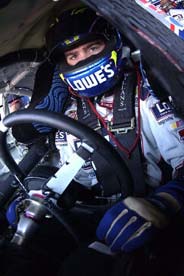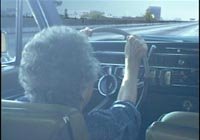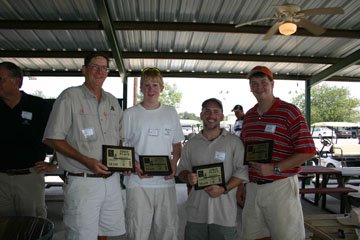
Well, Earth Day passed without much acknowledgement at the Dark Adapted Ranch, though I did drive my Ford Escape Hybrid a bit on Thursday, so I guess that's some kind of commemoration.
I had a 2001 Toyota Avalon that was five-plus years old, paid for, giving me no problems whatsoever and had a whopping 35,000 miles or so on it. So why did I get a hybrid? That's a complex answer.
First, I'm a gadget freak, and I think I heard someone say that "He who dies with the heaviest toy wins," so a 3,150 lb car would put me ahead there. Second, I'm not a tree-sitting Hummer-torching Enviro-Loonie, but I do hate paying for gas and in-town I was getting about 19-20mpg in the Avalon, maybe 25 on the highway. Third, my driving profile would seem to work very well for a hybrid car, I drive about 7 miles each day to and from work in town with a max speed limit of 45 mph on any stretch. Fourth, I chose the SUV class for a hybrid because I'm too big for the current car-type hybrids, and of the ones available (Toyota Highlander, Lexus R400h, Ford Escape), only the Escape offered an efficient package in my opinion for the way I drive. The Ford Escape is the only SUV hybrid with a 4-cylinder engine, in the other cars the hybrid package is designed to boost performance moreso than economy, and economy was what I was after. Plus, it was cheaper than the other two ($32,095 out the door, sticker price).
So on March 13, 2006 I became a hybrid owner courtesy of Tyler Ford, and me and my silver 2006 Ford Escape Hybrid have been getting to know each other. If you're interested, I have some impressions to share.
A hybrid is a car that has two power sources connected to a common transmission: a gasoline engine and an electric motor. In the case of my car, they are a 2.3-L in-line four-cylinder Atkinson cycle gasoline engine, and a 94hp (max efficency) electric motor powered by a large NiMH battery, the equivalent of 250 D-cell size batteries. The 'gas pedal' is electronically-controlled and the 'hybridness' is largely transparent, a computer decides whether you get power to the wheels from the electric motor, the gasoline engine, or both. The car has a more-efficeient automatic transmission called a continuously-variable transmission, in essence it never changes gears.
The ICE (Internal Combustion Engine) not only drives the car when needed but charges the battery as needed, the battery is also charged when you stop through regenerative braking, turning the kinetic energy of the car into electrical energy for your battery instead of wasting it as heat in the brake pads. The smarts are all in the computer and transmission, and Ford showed the smarts to buy the hybrid system largely intact from Toyota. The difference is that I actually can get my 6'5" frame into a Ford Escape, and would do so with some discomfort in a Prius. You can certainly drive a hybrid as a normal car and never give a second thought to maximizing your fuel-efficency and minimizing your environmental impact. It's been designed to be as transparent as possible, the only difference if you use it this way is that your car shuts off at red lights and fires up again with vigorous acceleration.
But that's not me. At heart, I'm a systems analyst, and there's nothing I like more than being given a complex system to analyze. One of the best computer-gaming experiences I had was getting a game called 'X-COM' without any documentation, then figuring out the rules for myself, the game of deducing the game was as much fun as the game itself. Driving a hybrid is also a game and requires some rules, and here's the ones I have deduced so far:
 What game are you playing in your car? For some folks, the game is Shortest Time. For me, it's Highest MPG, and given access to the data if you're driving a hybrid for efficiency you'll probably end up doing that, too. It's funny, I don't get frustrated with other people when my engine isn't running, or when their acceleration is so slow that I can keep up with them on batteries. I have the luxury of Doing Something in my car (saving gas), instead of rushing from place to place to Do Something when I arrive. It's a new perspective for me, and strangely stress-reducing. My attention is on being efficient, not being first. I don't mind red lights, they don't cost me anything if my ICE isn't running. I do corner a little harder than I did before, largely to keep up momentum, and I love to slip past a yellow light because I know there won't be anyone behind me to anger (see next point). It has changed how I drive, and since I Drive to Live instead of Live to Drive, I'm thinking I can let my Car and Driver subscription lapse as well.
What game are you playing in your car? For some folks, the game is Shortest Time. For me, it's Highest MPG, and given access to the data if you're driving a hybrid for efficiency you'll probably end up doing that, too. It's funny, I don't get frustrated with other people when my engine isn't running, or when their acceleration is so slow that I can keep up with them on batteries. I have the luxury of Doing Something in my car (saving gas), instead of rushing from place to place to Do Something when I arrive. It's a new perspective for me, and strangely stress-reducing. My attention is on being efficient, not being first. I don't mind red lights, they don't cost me anything if my ICE isn't running. I do corner a little harder than I did before, largely to keep up momentum, and I love to slip past a yellow light because I know there won't be anyone behind me to anger (see next point). It has changed how I drive, and since I Drive to Live instead of Live to Drive, I'm thinking I can let my Car and Driver subscription lapse as well. Driving a hybrid is like playing 'Operation': If you hear the buzz, you've made a mistake. The ICE always comes on at startup and, depending on engine temperature will run for 3-7 minutes. When it shuts off, you can barely tell, but then you're in 'Bonus Time', where you're making progress down the road without paying ExxonMobil for the privilege. The key at this point is careful throttle management. It's a fly-by-wire throttle, so a careful tread on the pedal is necessary for goosing it along without triggering the ICE again. You can tell you're 'winning' when the tachometer drops to zero, you're losing when that evil needle jumps back up to 1200 rpm or so. A light touch is necessary to stay in Bonus Time. The shudder of the ICE lighting up (it will start in 400 milliseconds if needed) is my new designator of failure.
Driving a hybrid is like playing 'Operation': If you hear the buzz, you've made a mistake. The ICE always comes on at startup and, depending on engine temperature will run for 3-7 minutes. When it shuts off, you can barely tell, but then you're in 'Bonus Time', where you're making progress down the road without paying ExxonMobil for the privilege. The key at this point is careful throttle management. It's a fly-by-wire throttle, so a careful tread on the pedal is necessary for goosing it along without triggering the ICE again. You can tell you're 'winning' when the tachometer drops to zero, you're losing when that evil needle jumps back up to 1200 rpm or so. A light touch is necessary to stay in Bonus Time. The shudder of the ICE lighting up (it will start in 400 milliseconds if needed) is my new designator of failure. Your ability to maximize hybrid fuel economy depends on your tolerance for frustrating other drivers. I have received my last speeding ticket, I ought to just get a big sign in the back window that says: HYBRID -- GO AROUND. A hybrid will accelerate and keep speed with other cars in traffic, but if you do that you're not using the batteries most of the time and you're paying the weight penalty of dragging around all the extra hybrid components in the car. There is a balance you need to find between keeping pace with traffic and lowering your environmental output, for me that balance is found in differing route selections. Nobody minds if you glide silently on battery power at 25mph through a residential neighborhood. If you can make the trip on batteries, even a slightly longer trip will be more efficient if you can do it slower and with less reliance on the ICE. I don't feel that I have the right to frustrate people for environmental reasons, so I just try to stay out of their way as much as possible.
Your ability to maximize hybrid fuel economy depends on your tolerance for frustrating other drivers. I have received my last speeding ticket, I ought to just get a big sign in the back window that says: HYBRID -- GO AROUND. A hybrid will accelerate and keep speed with other cars in traffic, but if you do that you're not using the batteries most of the time and you're paying the weight penalty of dragging around all the extra hybrid components in the car. There is a balance you need to find between keeping pace with traffic and lowering your environmental output, for me that balance is found in differing route selections. Nobody minds if you glide silently on battery power at 25mph through a residential neighborhood. If you can make the trip on batteries, even a slightly longer trip will be more efficient if you can do it slower and with less reliance on the ICE. I don't feel that I have the right to frustrate people for environmental reasons, so I just try to stay out of their way as much as possible. Think like a bicyclist. Driving a hybrid will make you access the vertical data you store but never consider when driving a conventional car. Think about your route to a common destination like school or work. Where are the hills? Are they steep or gradual? Is there a route where you can take a more gentle slope? Or one where you can burst up a hill on the ICE rather than grinding slowly up the hill for a longer period of time at a slower rate? I'm still working on local strategies, but for starters I boost up the hill and let off the gas just before the apex, coasting over and down before adding gas to get back up the hill. It's the third dimension of driving that you never think about but may be significant. I have gotten my car up to 45mph on batteries alone running downhill, which is unimpressive unless you drive a hybrid, too.
Think like a bicyclist. Driving a hybrid will make you access the vertical data you store but never consider when driving a conventional car. Think about your route to a common destination like school or work. Where are the hills? Are they steep or gradual? Is there a route where you can take a more gentle slope? Or one where you can burst up a hill on the ICE rather than grinding slowly up the hill for a longer period of time at a slower rate? I'm still working on local strategies, but for starters I boost up the hill and let off the gas just before the apex, coasting over and down before adding gas to get back up the hill. It's the third dimension of driving that you never think about but may be significant. I have gotten my car up to 45mph on batteries alone running downhill, which is unimpressive unless you drive a hybrid, too. Not to short, not too long, just right The first 3-7 minutes of any trip, you will be driving a heavier version of a conventional car and probably get slightly worse gas mileage. If your trips are mostly 5 minutes in length, you won't benefit from a hybrid at all. The ideal trips are ones in town, 15-20 minutes or more long at speeds in the 35 mph range. On the highway, my Escape Hybrid got 30.3 MPG at 70mph from my house to my sister's house 135 miles away, but in Dallas that weekend running 20-25 minute trips I had my average fuel economy up to 32, suggesting that I was coming close to the EPA City number of 36 MPG. In practice, I have managed to get 29 mpg in town with my short trips and careful throttle control and route selection, which isn't great compared the the EPA number but is about 50% better than I was getting in my Avalon.
Not to short, not too long, just right The first 3-7 minutes of any trip, you will be driving a heavier version of a conventional car and probably get slightly worse gas mileage. If your trips are mostly 5 minutes in length, you won't benefit from a hybrid at all. The ideal trips are ones in town, 15-20 minutes or more long at speeds in the 35 mph range. On the highway, my Escape Hybrid got 30.3 MPG at 70mph from my house to my sister's house 135 miles away, but in Dallas that weekend running 20-25 minute trips I had my average fuel economy up to 32, suggesting that I was coming close to the EPA City number of 36 MPG. In practice, I have managed to get 29 mpg in town with my short trips and careful throttle control and route selection, which isn't great compared the the EPA number but is about 50% better than I was getting in my Avalon.As far as the car goes, it's missing some goodies that I had in my Avalon, like the auto-dimming rearview mirror, the temperature readout (though I'm not yet sure I can't get that info, I just haven't read the manuals) and the HomeLink integrated garge door opener. I have to manually turn the headlights on and off, which took some getting used to after 5 years with a slightly smarter car. The acceleration is a little less, which just means I have to think more. On the other hand, it has a GPS navigation system that is pretty trick, and it handles speed bumps better than my last car. The biggest plus is that I've been driving for 23 days and I'm still at half a tank, I expect to make it into May without filling up. Having been on the highway and in town over the last six weeks, I can't really lodge a complaint. I really like the car.
And I'm not writing this to fill the air with Smug, the Federal Tax Credit that accompanies the car is enough reward, plus the fun of a new game inside the usual game of getting from Point A to Point B. I DO NOT think I am better than you or anyone else, I am not a better steward of the environment, etc. I DO think there is a bright future for hybrids, particularly plug-in hybrids with more powerful lithium-ion batteries. I could probably get to work in a plug-in hybrid on electricity alone. The current hybrids aren't a patch on the potential of the diesel-electric hybrid car. Whether we in the US realize it or not, Europe has seen a renaissance of the small diesel engine and with ultra low-sulfur diesel coming out this year, it's likely we'll have cars with even better efficiency than gasoline hybrids. Diesels are ideal generators as they run most efficiently at fixed rpms and temperatures, and a diesel-electric hybrid car could get real-world 70-80 mpg within the next few years.
The hybrid will go mainstream this year when Toyota offers a Camry hybrid variant as part of the 2007 model year, and if you can afford the difference it's worth a test drive at least. I look forward to your comments!
